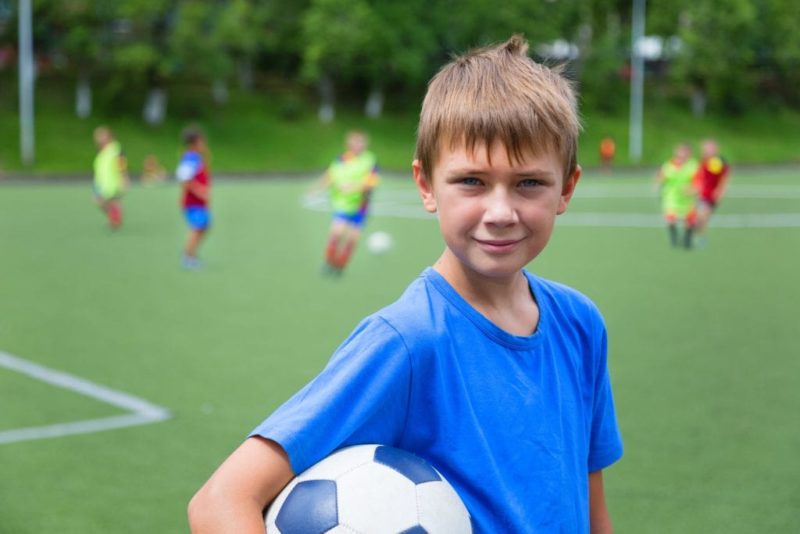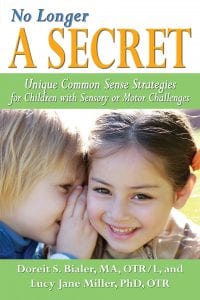Helping your Child with Sensory Processing Disorders… it’s no longer a secret!
Occupational Therapy Helping Children’s Founder and Director, Lisa Hughes, shares a great strategy for helping children with sensory processing challenges.
In July this year, I travelled to the STAR Institute for Sensory Processing Disorder to complete an Advanced Intensive Mentorship for the Diagnosis and Treatment of Sensory Processing Disorder. It was an incredible week, full of intensive learning, experiencing live treatment sessions run by experts in the field, meeting health professionals from all around the world, and the highlight was meeting Lucy Jane Miller.
One of the highlights of the week was a lecture on ‘A SECRET to Success with Kids who have Sensory Processing Disorder’. ‘A SECRET’ is a clinical reasoning treatment tool for therapists, as well as a strategy that can be used at home and school.
So what does ‘A SECRET’ stand for?
A = Attention
S = Sensation
E = Emotional Regulation
C = Current Condition
R = Relationship
E = Environment
T = Task
How A SECRET works, is you take one area that your child is challenged in, and use the acronym to develop a wide variety of strategies to help your child move forward in the challenged area. Let us look at a motor skills challenge, like soccer.
A = Attention
Could the problem be that your child is not staying focussed on the game? What can you do to help them stay focussed on the game? Could you set some personal goals for them like, how many times they have to kick the ball, or how many passes they have to do etc.?
S = Sensation
Could some type of sensory input help your child at soccer? We know that heavy work helps develop children’s motor skills as well as calming them down, so perhaps do some wrestling, push ups or have a big warm up on the trampoline at home before you go to soccer.
E = Emotional Regulation
For a child with motor challenges, soccer is hard for them to play, as are all team sports. Helping your child feel balanced and self-regulated before the game, will get them off to a good start. Perhaps you could play some calming music in the car on the way to soccer, or give them something to fiddle with, or a hard chewie or crunchy foods to munch on.
C = Culture or Current Conditions
How can you change the conditions so that the soccer game is more enjoyable for your child? Maybe you could drive them to soccer instead of making them walk, so they are not rushing to get ready or you could plan to do something special together after the game. If the soccer culture is just too much for your child, you might need to consider more individualised, less competitive sports like swimming, sailing or gymnastics.
R = Relationships
As a parent, you are the most powerful tool that a child has. You are a constant in their life and can soothe, support and help balance their emotions. One important aspect to do with your child is to co-regulate. This means projecting your own emotional tone on your child. If you are stressing about your child’s performance on the way to a sporting event, your child will notice it. If you are saying encouraging things on the way to soccer and cheering from the sidelines, the complete sporting experience will be a lot more positive.
E = Environment
Is there anything about the environment that you could change to make your child’s experience more positive. In the case of soccer, think about visual and auditory distractions. Is the team running into the sun and the environment is too bright for your child? Is your child having difficulty hearing the coach because of all the background noise on the field?
T = Task
Can you work with your child to make the task easier for them? In the case of soccer, you could practise in the backyard or take them to the park after work to practise kicking goals. Children with motor planning issues improve their skills by having tasks broken down into small achievable steps and lots of repetition.
A SECRET is not too hard to learn! It is a simple way of improving your child’s happiness and the harmony of your family.
For more information on A SECRET, grab a copy of Doreit S. Bialer and Lucy Jane Miller’s book, No Longer A Secret: Unique Common Sense Strategies for Children with Sensory or Motor Challenges. This book goes through A SECRET in detail and gives lots of practical strategies and activity suggestions for parents to use at home.
If your child needs additional help with their sensory processing or you’d like more strategies to help your child at home, please talk to your child’s Occupational Therapist or get in touch to organise a session with one of our OTs.



